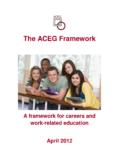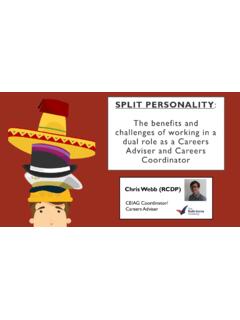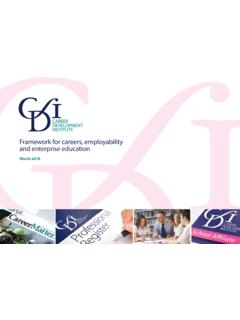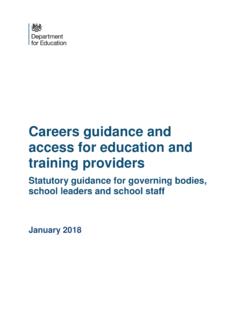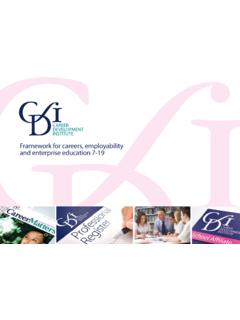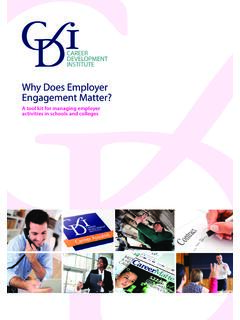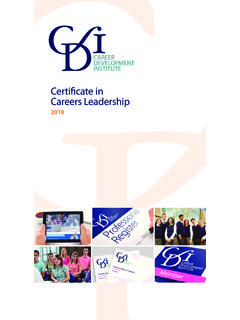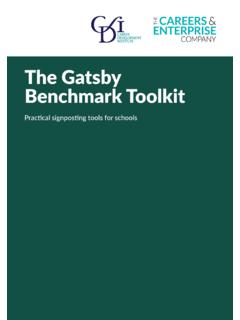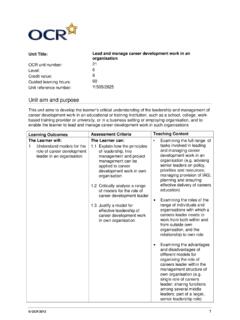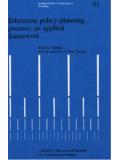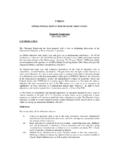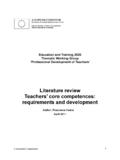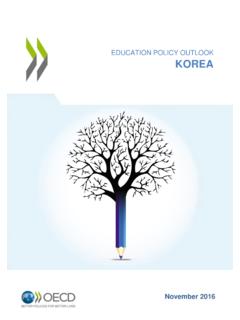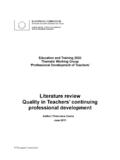Transcription of Framework for careers, employability and …
1 Framework for careers, employability and enterprise education 7-19 The CDI has an important role to play in supporting career educators and career advisers to simply do their jobs the education and employment sectors there is whole hearted agreement that young people need high quality careers support to help set them on the road to a fulfilling working life. Schools and colleges are at the heart of putting that into place, and rely on other partners, including employers, universities, apprenticeship providers and careers advisers, to contribute practical experiences, information, insight and inspiration. International evidence highlights that, for all of those efforts to be fully effective, the activities need to be coherent and carefully planned and integrated into a programme of careers, employability and enterprise education , with clear and explicit learning career Development Institute, the professional body for the careers sector, is delighted to offer this Framework of learning outcomes to support the shared endeavour of planning, delivering and evaluating high quality careers believe our young people deserve nothing less.
2 Virginia IsaacPresident of the career Development InstituteForewordPresident, career Development InstituteNovember 2015 Introduction to the CDI Careers Framework The 17 areas of learning for careers, employability and enterprise educationHow can the Framework be used?Guidance on using the CDI careers frameworkThe Framework Further InformationContentsAcknowledgementThe CDI wishes to thank members of the Community of Interest for career education for revising the ACEG/CDI Framework for careers education professionals. The Framework is intended to be used to devise and develop programmes of careers, employability and enterprise education in schools and colleges, both as taught subjects and across the curriculum.
3 We hope the Framework will inspire schools and colleges to design and plan more ambitious, engaging and worthwhile programmes of careers, employability and enterprise education for their learners. Further resources to support curriculum development are available on the CDI website. CDI, 201503040708101502 The Framework is a practical resource which can be interpreted flexibly by schools and colleges according to the particular needs of their to the CDI Careers FrameworkWho is this Framework for?This Framework is for: career leaders and other curriculum leaders responsible for planning, reviewing and developing programmes of careers, employability and enterprise education teachers and tutors teaching careers, employability and enterprise lessons and providing information, advice and support subject teachers making links between their schemes of work and careers, employability and enterprise education senior leaders responsible for the overall strategy for careers, employability and enterprise education career advisers, enterprise advisers, employers and other individuals working with schools and colleges to contribute to careers, employability and enterprise is the purpose of the Framework ?
4 It has been developed principally for use in England where there is no longer a national curriculum Framework for careers, employability and enterprise education , but it could also be a useful resource in other parts of the UK to supplement their national Framework of learning outcomes has been prepared by the career Development Institute to support the planning, delivery and evaluation of careers, employability and enterprise education for children and young people, Framework is structured around the three core aims of: Developing yourself through careers, employability and enterprise education Learning about careers and the world of work Developing your career management, employability and enterprise skillsThe Framework presents learning outcome statements for students across seventeen important areas of careers, employability and enterprise learning.
5 These statements show progression from Key Stage 2 through to post-16 education and training. It also offers examples of suggested activities that will help students to achieve the learning outcomes. The Framework is a practical resource which can be interpreted flexibly by schools and colleges according to the particular needs of their learners. The structure builds on the ACEG Framework for careers and work-related education (CDI, 2012) so that there is continuity for practitioners and partners. It has, however, been updated to reflect key national policy developments in relation to the careers and inspiration as a learnerExploring careers and career developmentInvestigating work and working lifeUnderstanding business and industryInvestigating jobs and labour market information (LMI)Valuing equality, diversity and inclusionLearning about safe working practices and environmentsIndividuals who realistically appraise their qualities and skills, roles and responsibilities, values and attitudes, needs and interests, aptitudes and achievements are better able to understand themselves, make informed choices and relate well to others.
6 Self-awareness provides individuals with the foundation for enhancing their self-esteem, developing their identity and achieving personal enables individuals to develop personal autonomy, self-efficacy and personal agency. It boosts hope, optimism, adaptability and resilience. Self-determination empowers individuals to realise their aspirations and manage their fosters positive attitudes to lifelong learning and the skills of planning, review and reflection. Understanding what they have learned, what they need to learn next and how they learn best enables individuals to develop their potential. career exploration expands individuals horizons and opportunities. A better understanding of career processes and structures enables individuals to make sense of and manage their own careers.
7 It also enables them to appreciate the career experiences of people s experiences of work enables individuals to understand the meaning and purpose of work in people s lives. They learn what constitutes good or decent work and how to find it for themselves. Understanding types of business and business functions enables individuals to prepare for employment and to appreciate the contribution of business and industry to social and economic need to know how to access, analyse and act on relevant and appropriate job and labour market information when choosing and planning for need to recognise that the commitment to equality, diversity and inclusion in British society benefits them as much as others.
8 By resisting the damage caused by stereotyping, discrimination and prejudice, individuals can realise their own ambitions and help others to do about safe working practices and environments helps individuals to keep themselves and others healthy and safe at yourself through careers, employability and enterprise educationLearning about careers and the world of workThe 17 areas of learning for careers, employability and enterprise education04 Making the most of careers information, advice and guidance (CEIAG)Preparing for employabilityShowing initiative and enterpriseDeveloping personal financial capabilityIdentifying choices and opportunitiesPlanning and decidingHandling applications and interviewsManaging changes and transitionsIndividuals need to learn how to recognise trusted sources of information, advice and guidance and how to make effective use of all the sources of help and support available to them, including one-to-one priority for individuals is to gain the skills and experience that will enable them to get jobs and sustain themselves in initiative and enterprise helps individuals to learn about risk.
9 Effort and making the most of increasing cost of training and further and higher education makes it essential for individuals to know about managing their money. They need to know how to make decisions about spending, saving and investing to ensure their economic well-being now and in the need to be able to research and recognise suitable progression pathways and qualifications. Using networking, negotiation, information and evaluation skills enables individuals to maximise their choices and opportunities, including those that are unforeseen or unplanned. Individuals need to know how to get information, clarify values and preferences, identify alternatives, weigh up influences and advice, solve problems, review decisions and make plans.
10 It also involves being able to cope with chance events and unintended themselves in a way that attracts the attention of selectors and recruiters as well as managing the applications process requires individuals to develop a range of self-presentation and marketing skills that they will need throughout their and decisions can break down if individuals fail to prepare for the career moves they need to make. Awareness of how to cope with life changes and transitions, partly gained from reflecting on previous moves, can support lifelong career development and your career management and employability skillsWhat is the policy context for this Framework ?The Department for education s Statutory Guidance issued in March 2015 identifies the need for schools to: Have a strategy for the careers guidance they provide to young people.
